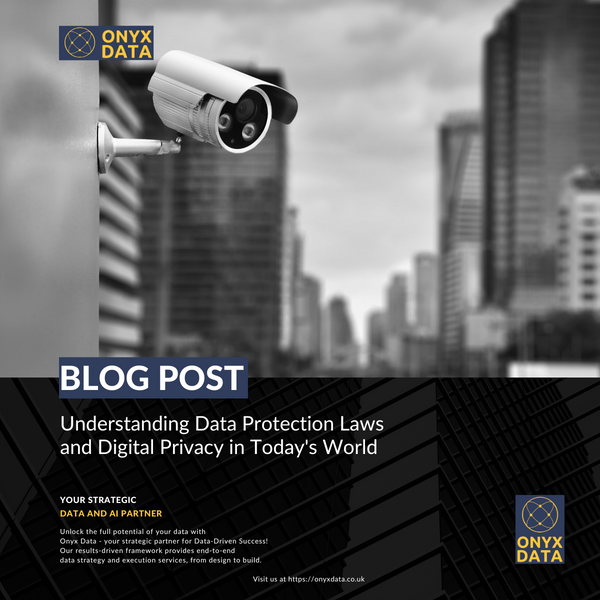Understanding Data Protection Laws and Digital Privacy in Today’s World

Understanding Data Protection Laws and Digital Privacy in Today’s World
In today’s digital age, where personal data flows like a currency, safeguarding individuals’ privacy and sensitive information have become paramount. Governments worldwide have recognised the need for comprehensive data protection laws to regulate the collection, processing, and storage of personal data.
In this blog, we will delve into the significance of data protection laws, the General Data Protection Regulation (GDPR) and it’s Indian counterpart, the Data Protection Bill of India, and how digital privacy is upheld in social media.
Additionally, we will explore the concept of data protection for children and whether the UK has an equivalent to the Children’s Online Privacy Protection Act (COPPA) in the United States.

Why Do We Need The Data Protection Act?
The Data Protection Act, also known as data protection legislation, serves several crucial purposes:
Protecting Privacy: It safeguards individuals’ privacy rights by ensuring that organisations handle their personal data responsibly and securely.
Empowering Individuals: The Act gives individuals greater control over their personal data, allowing them to know how their information is being used and to request its removal or correction.
Preventing Data Misuse: It helps prevent the misuse of personal data, such as unauthorised access, data breaches, or spamming.
Fostering Trust: Establishing a legal framework for data protection builds trust between individuals and organisations, encouraging responsible data handling.
Global Harmonisation: The Act aligns with international data protection standards, contributing to global data protection harmonisation.
Why Is There a General Data Protection Law?

A general data protection law, such as the GDPR in the European Union, is essential for several reasons:
Uniform Standards: It establishes uniform data protection standards across industries and jurisdictions, ensuring consistency in how personal data is handled.
Global Impact: Many international businesses interact with EU citizens, necessitating compliance with the GDPR, which has extraterritorial applicability.
Enhanced Accountability: It holds organisations accountable for data breaches and non-compliance, with potential fines for violations.
Privacy by Design: It promotes a privacy-by-design approach, encouraging organisations to integrate data protection measures into their systems and processes from the outset.
Transparency: It mandates transparent data practises, requiring organisations to inform individuals about data collection, processing, and storage.
What Is The Data Protection Bill Of India?

The Data Protection Bill of India is a significant legislative development aimed at addressing data protection concerns in the country. Key highlights include:
Data Localisation: It proposes the storage of a copy of personal data within India, ensuring that data remains within the country’s borders.
Consent: The Bill emphasises obtaining explicit consent from individuals before processing their data.
Data Processing Restrictions: It introduces restrictions on cross-border data transfers and data processing, prioritising data sovereignty.
Penalties: The Bill includes provisions for penalties in case of data breaches or non-compliance, similar to GDPR fines.
Data Subject Rights: It empowers data subjects with rights such as data access, correction, and the right to be forgotten.
Is There An Equivalent Of COPPA in the UK?
In the United Kingdom, there isn’t a direct equivalent of the Children’s Online Privacy Protection Act (COPPA), which is a US law designed to protect children’s online privacy. However, the UK has its regulations and safeguards in place for protecting children online:
Age-Appropriate Design Code: The UK’s Information Commissioner’s Office (ICO) has introduced the Age-Appropriate Design Code, which requires online services to put the best interests of children at the forefront when designing their platforms.
Online Safety Bill: The UK government is working on the Online Safety Bill, which aims to regulate online platforms and hold them accountable for harmful content, including content that may impact children.
Educational Initiatives: Various educational initiatives and campaigns are run in the UK to promote online safety and digital literacy among children and young people.
How Are We Protecting Digital Privacy In Social Media?
![]()
Protecting digital privacy in social media is crucial, considering the vast amounts of personal information shared on these platforms. Here’s how this is achieved:
Privacy Settings: Social media platforms provide privacy settings that allow users to control who can see their posts, profile information, and contact them.
Data Encryption: Many social media platforms use encryption to protect the transmission of messages and data, ensuring they can’t be intercepted easily.
Two-Factor Authentication (2FA): Enabling 2FA adds an extra layer of security to social media accounts, reducing the risk of unauthorised access.
User Education: Platforms often provide resources and guidelines on privacy best practises to educate users about protecting their information.
Regulation and Compliance: Governments and regulatory bodies oversee social media companies to ensure they comply with data protection laws and maintain user privacy.
In conclusion, data protection laws like the GDPR and India’s Data Protection Bill play a vital role in safeguarding personal data in an increasingly digital world.
While the UK may not have an exact equivalent to COPPA, it has its measures to protect children online. Moreover, protecting digital privacy in social media involves a combination of user controls, encryption, and regulatory oversight to ensure that personal information remains secure.
Click, read, and hear more about data and artificial intelligence with our blogs on our website.
Citations
https://ico.org.uk/about-the-ico/information-commissioner-s-response-to-the-data-protection-and-digital-information-no-2-bill/
https://www.shlegal.com/insights/take-two-what’s-new-in-the-latest-uk-data-protection-and-digital-information-bill
https://www.pinsentmasons.com/out-law/analysis/uk-data-protection-digital-information-bill
https://www.ukfinance.org.uk/news-and-insight/blog/return-data-protection-and-digital-information-bill
https://www.parliament.scot/bills-and-laws/legislative-consent-memorandums/data-protection-and-digital-information-bill
https://www.dentons.com/en/insights/articles/2023/may/2/uk-data-protection-digital-information-bill
https://commonslibrary.parliament.uk/research-briefings/cbp-9606/
https://www.gov.uk/data-protection
https://commonslibrary.parliament.uk/research-briefings/cbp-9606/




